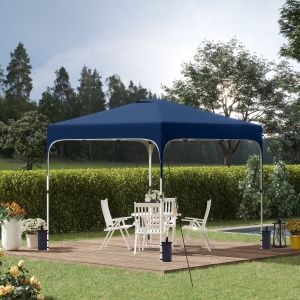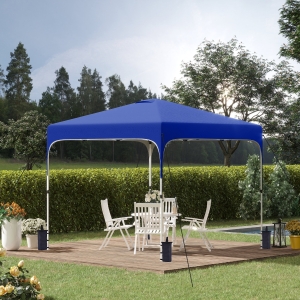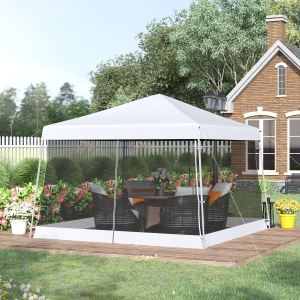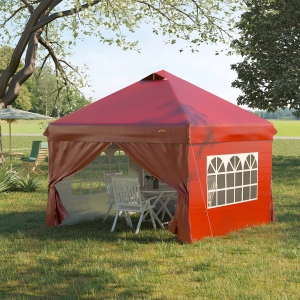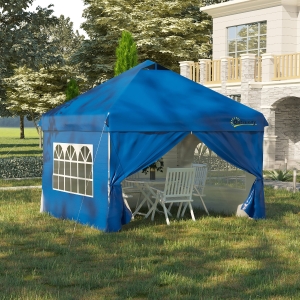Pop Up Canopies
- Popularity
- Price(high to low)
- Price(low to high)
- Greatest Discount
- Date Added (Newest to Oldest)
Pop Up Canopy
Easy-to-use, affordable, no assembly required. If these are the qualities that you want in your outdoor tent, then an instant canopy would be the best option for you. Also called pop up tents, these canopies feature expandable frames with four height-adjustable legs. A pop up canopy Canada doesn’t need to be put together but just have to be expanded. It is easy to fold back pop up tents and carry from one location to the other.
Why to get pop up tents?
When you're selecting the right outsunny pop up tents for your event, size does matter. How big should your tent be? It really depends on what type of seating and other extras you are going to have. For example, if your party is going to be relatively simple without a lot of extra furnishing, give each guest 10 to 12 square feet of space. On the other hand, if your party needs a more complicated set-up, it can be a bit more difficult to know how much space is enough.
Pop-up canopies, also called instant canopies, have a well-deserved reputation for being the most user-friendly type of canopy. Why are these canopies considered so convenient? That would be due to the unique accordion-style frames that collapse and expands easily with just a little pulling and pushing. Many like this type of canopy since it only takes one or two people to set up and take down without the use of any tools. However, it should be noted that no two canopies are going to be exactly the same regarding construction, but all shelters labeled as "pop up" should have a set up similar to this. If the assembly has many complicated steps or requires tools, it's not truly an instant canopy. Be sure to keep that in mind while searching because products can sometimes be mislabeled or, unfortunately, have names that are designed to mislead you. So once you've decided to get one, finding the right one is the next step. Unfortunately, that can be much less user-friendly. There are many styles and sizes available, so how do you know which one is the right one for you? With this guide, you'll find that selecting the right one isn't as intimidating as it might first appear.
The first step is determining what instant canopy fits your needs. What are you planning on using your shelter for? That has a direct correlation to the size of canopy needed. For example, a canopy that is going to be used for a backyard barbecue would need to be bigger than one used for a craft show. The amount of space you need depends on what your plans are.
Now that we've covered basic pop-up canopies, we can get into accessories and other customization. These are ways to make sure all your canopy needs are met. Some of the accessories are structural while others make your canopy more convenient to use. A few of the most common types of accessories are sidewalls, stakes and anchors, and storage bags.Sidewalls are just what the name implies. They enclose some or all of your canopy for privacy or weather protection. You typically have a few different options of types of sidewalls, though it does depend on the manufacturer. Mesh walls, half walls, full sidewalls, some even have food service walls!
However, it should be noted that no two canopies are going to be exactly the same regarding construction, but all shelters labeled as "pop up" should have a set up similar to this. If the assembly has many complicated steps or requires tools, it's not truly an instant canopy. Be sure to keep that in mind while searching because products can sometimes be mislabeled or, unfortunately, have names that are designed to mislead you.So once you've decided to get one, finding the right one is the next step. Unfortunately, that can be much less user-friendly. There are many styles and sizes available, so how do you know which one is the right one for you? With this guide, you'll find that selecting the right one isn't as intimidating as it might first appear.
Unfortunately, individual circumstances vary so there is no definite way to determine an ideal canopy size. However, you can get a rough estimate of how much room you need by allowing ten to twelve square feet per person when hosting a party.With chairs or lecture-like layouts, you could presume five to six square feet per chair. Or, for an event with meals, you can estimate around 12 square feet per person when using round tables, or 10 when using rectangular ones. For business and commercial uses, the way to estimate is a little different. For a craft tent, sales booth, or display center, instead of measuring for people, the best way to determine your space requirements is to measure all of the items. This will indicate what size canopy you need.
Tent Care Tips: How to Make Your Tent Last Longer
Instant canopies don't have to be a great mystery. In fact, now you should know enough to make the whole process go a lot smoother. It may seem like a lot to consider, but once you go through the process step by step, you'll see that you're ready to find the perfect canopy!
1. WASHING YOUR CANOPY FABRIC To clean your canopy, simply use warm, soapy water. Dish detergent works well and will remove any heavy deposits. Remove the soap off both sides before setting the canopy up to dry. A garden hose with a spray nozzle set to a? flat? setting works well. Spray from top to bottom in vertical swipes until all of the soap residue has been removed. Do not use bleach - it will cause the fabric to discolor.
2. DRYING THE CANOPY FABRIC Fully stretch the canopy fabric out. To keep it off the ground, you can use a clothesline, sawhorses, or even the bed of a pickup truck. Many trucks will have a black spray in or fiberglass bed liner that retains heat, speeding the drying process. Allow air and light to hit as much of the fabric as possible — this will reduce the chance of mold and mildew.
3. FOLDING THE FABRIC Fold it along existing creases and folds to better help it retain its natural shape. Never bunch up the canopy top or force it into storage bags. The sharp and random folds that will result from this practice severely truncates the expected life of the fabric.
4. REPAIRING YOUR CANOPY FABRIC Unfortunately, snags and tears are bound to happen for any well used canopy top. When you notice holes and tears, fix them as soon as possible before they continue to rip! If you have a tear, consider a seam sealer or a patch kit.
5. Do not use your canopy in strong winds. The design of pop-up canopies makes them highly susceptible to uplift. Unsecured canopies may blow over, causing potential property damage or injuries.
6. Don't let rain pool on the top of your canopy. Not only will pooling water cause the canopy fabric to stretch, but the excessive weight may damage canopy truss bars and brackets.
7. Never keep the canopy up when lightning is present. Canopies are not meant for use as a severe weather shelter!
8. If your canopy is not rated for snow loads, do not let snow build up on it. As with pooling rain water, excessive amounts of snow will stretch the fabric and potentially damage the frame. Take careful note of the snow ratings provided in your owner's manual.
9. Most carrying bags for canopies are not universal. Make sure you have the correct one for your specific model! Some are soft-shelled, while others are hard. Pick the right one for you and your model.
10. To make your canopy sturdier, consider using weight bags or gravity tubes. These products are highly recommended if the canopy will be used on hard surfaces that will not allow use of tent stakes or augers.
11.There are a wide variety of canopy accessories. Sidewalls, anchors, stakes, and pole covers are just some of the different ones you can find.
These are just some of the considerations responsible consumers consider when buying a pop up tent. In any case, Aosom Canada has the best selection of these products and you can sure we did our homework and offer a selection that is perfect for any occasion and with our ready to use pop up tents, you are only a few minutes away from shelter and an amazing experience.















































